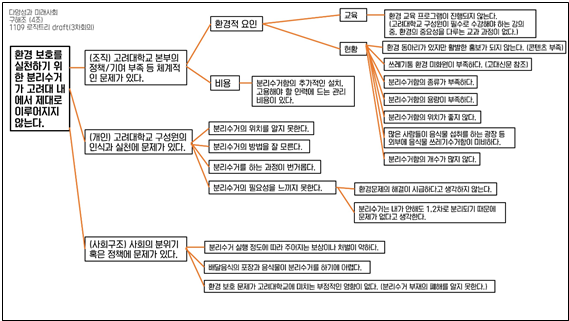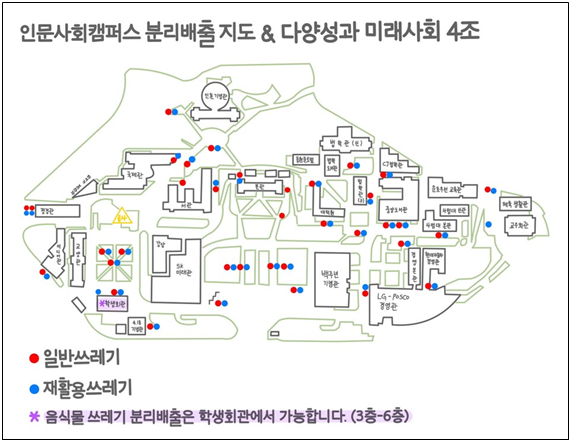Elective General Studies Course “Diversity for the Future”1) |
The Diversity Council proposes a three-step education model linking General Studies Course-Major-related Course-Major Course to establish an education system based on diversity. <Diversity for the Future> is a general studies course in the first step, created to develop the diversity competence of undergraduates by educating the value of diversity. It is the goal of this course that students realize the importance of respecting diversity and have a sense of coexistence without discriminating against other groups. Since this course was first offered as a first-level elective general studies course in the second semester of 2020, two courses with the same title have been offered every semester.
1. Purpose of Program
A. Background of establishing the Course
□ Diversity education is the process of preparing students to live and
work in an increasingly diverse society. The main goal of a diversity
curriculum is for students to develop the capacities required to
respect and cooperate flexibly with different members of society.
It is also important to cultivate abilities to critically analyze social
problems in terms of diversity, to devise creative solutions and to
practice, in order to develop leadership in a highly diverse and hyper
connected global society.
□ To cultivate talented individuals in the global age where diversity is
emphasized, leading universities abroad have already designated
diversity courses as mandatory or graduation requirements or put
emphasis on diversity education in every major.
□ According to the <Korea University Diversity Opinion Survey>
conducted by the Diversity Council in 2019, undergraduates evaluat
ed that there are not enough diversity courses and programs in
Korea University. The Diversity Council is proposing and promotg a
systematically constructed diversity education program that starts
from general studies course as its agenda.
B. Motive of establishing the Course
□ <Diversity for the Future> was designed to develop the diversity com
petence of students.
□ As our society becomes more diverse, conflicts are intensified due
to the failure to embrace diversity and the burden on the communit
y is also increasing. It is the goal of this course that students realize
the importance of respecting and embracing diversity and have a
sense of coexistence without discriminating against other groups.
2. Content of the Course (as of the 2nd semester of 2020)
A. Learning Objectives
□ ‘Diversity for the Future’ has four learning objectives. Firstly, one
can diagnose and develop one’s diversity sensitivity on one’s own;
secondly, one can have a critical mind in terms of diversity regardin
g what happens in our society and think analytically about the cause
s and consequences of problems; thirdly, one can share, listen to
and embrace various opinions in the process of cooperating with
diverse members for the common goal; fourthly, one can develop
critical thinking as to the operational principle of the world and stre
ngthen one’s independence that leads to change the society in the
end.
B. Course Format
□ This course intends to provide the opportunities to learn about the
diversity of both oneself and society and takes a cognitive approach
(e.g. reflecting on the special lecture, solving problems) and a heuris
tic approach (e.g. self-reflective activities, learning in group dynamic
s) to achieve this learning objective.
□ Special lectures on various topics: Special lectures on how ‘diversity’-
related issues are addressed in various academic fields (e.g. sociolog
y, psychology, etc.) and industries (e.g. advertising industry, venture
s, etc.) were given eight times. Each 75-minute lecture consisted of
a 60-minute lecture and a 15-minute Q&A session, and when there
was not enough time for a Q&A session, students could exchange
their opinions on the topic through the Blackboard(Korea University
Cyber Classroom) Discussion Forum.
□ Team organization and activities: Based on some researches about
teamwork, each team was comprised of 4-5 students, so that it is
big enough for ‘diverse opinions’ to be presented and small enough
not to cause any free-riders. The instructor tried to organize the tea
m as diverse as possible in respect to the academic year, college,
gender, etc.
□ Carrying out Group Projects: Each team of 4-5 students found out
a diversity problem, defined it, analyzed the cause of the problem,
came up with the solution based on the analyzed cause, and tried
the solution. They approached the problem-solving in three steps of
searching problems, analyzing problems, and searching solutions,
and the instructor delivered a lecture on the methodology available
in each step (e.g. how to define a problem, how to analyze various
causes of the problem using Logic-Tree, how to research data throu
gh interviews or surveys, etc.). After the group discussion, the inter
mediate results were shared on the Blackboard, then the instructor
gave feedback so that students could find solutions to the problems
they defined. Every team selected its topic autonomously and carrie
d out the project on a variety of topics, from the problem of internat
ional students on campus to that of wheelchair users, vegetarians,
queers, and environmental pollution.
□ Opportunity to reflect on oneself: Students wrote a report reflectin
g on what they thought and felt during the special lectures and
group activities from a perspective of diversity. They also did some
activities that allowed them to reflect on themselves in the context
of diversity during the class. By using the personal/social identity
wheel, they could understand the manifoldness and complexity of
one’s identity. Activities that one sympathizes with the other perso
n’s story unconditionally enabled students to experience the importa
nce of reflecting one’s feelings and sympathizing. Through the role-p
laying in the group, they reflected on the impact of people with diffe
rent dispositions on the individual/organizational dimensions in grou
p dynamics.
C. Number of offered Courses
□ One course was offered in the second semester of 2020 and
two courses have been offered every semester since
the first semester of 2021.
D. Number of Students
□ The number of students for each course is limited to 45,
a maximum of 50.
3. Research Report of Students in the 2020 Lecture (excerpt) 2)
‘Environment’ as a Value of Diversity:
About Garbage Separation within Korea University Campus
The research team considered the environment as included in the diversity category of the earth and focused on the nearest environment. Through interviews, surveys, and observations, we identified the problems of accessibility of garbage separating within Korea University Campus and lack of practicing it and made Why Logic-Tree about this problem. In order to solve this problem, we presented several solutions with How Logic-Tree to facilitate the promotion of awareness to separate the garbage and its practice of Korea University members. Among the solutions, ‘Creating and Distributing the Map of Garbage Separation’ was selected as a feasible solution. As a result of conducting a pilot test, we had significant results that the map helps garbage separation of Korea University members, which might lead to encourage the members to protect the environment. (Excerpt from the research report) |
<Picture 1: Why Logic Tree >

<Picture 2: How Logic Tree >

<Picture 3: 분리배출지도 >

1) Planning and managing this course is supported by University Innovation Support Project of National
Research Foundation of Korea
2) Excerpt from the presentation of Group 4[Sung-Su Kim, Physical Education major(17), Ji-Hyun Lee, Media
& Communication major(19), Ga-Jin Kim, History major(19), Sun Choi, Sociology major(19), Chan-Young
Kim, Public Administration major(20)]